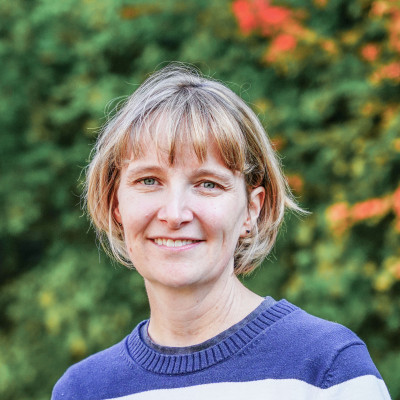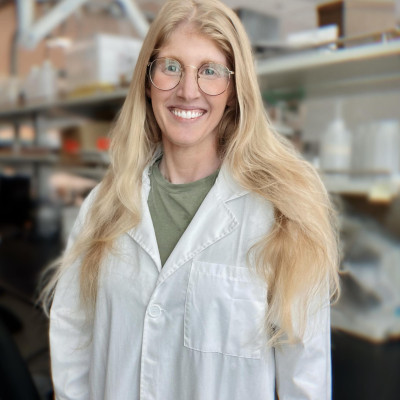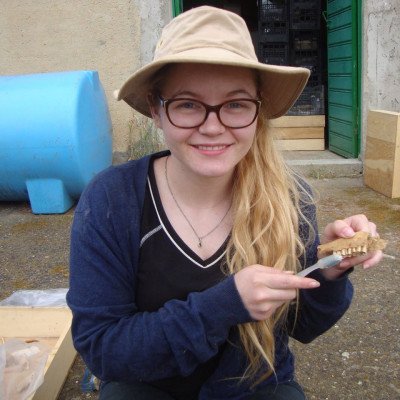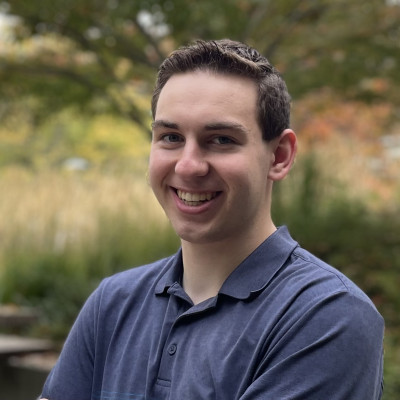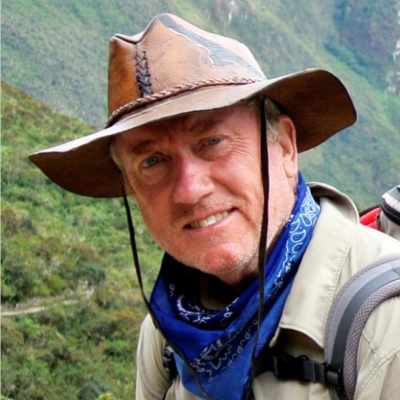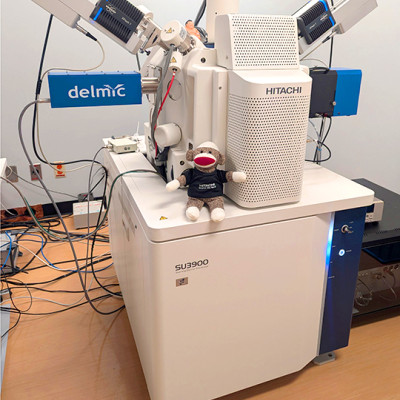News
Stay up-to-date with what's happening in EOAS
Dr. Louise Longridge honored with the 2025 AMS UBC UDL Champion Award
Dr. Louise Longridge is one of the recipients of the AMS UBC Universal Design for Learning (UDL) Champion Award, presented at the AMS UBC Teaching and Learning Champions Gala on April 1, 2025. Newly established this year, the UDL Champions Award recognizes faculty who integrate UDL—approaches that embrace learner diversity and aim to reduce barriers to education—into their teaching to promote accessible and equitable learning experiences.
Dr. Longridge was awarded for her dedication to improving inclusiveness and accessibility in EOSC 116 Mesozoic Earth: Time of the Dinosaurs (Hybrid). We are pleased to feature her perspective on receiving the award and the innovations behind EOSC 116 in the Q&A below.
Q: Could you introduce EOSC 116 (Hybrid) to us?
LL: The Hybrid Version of EOSC 116 (Mesozoic Earth: Time of the Dinosaurs) is an asynchronous course that runs in all three terms, with about 600 students a year taking the class from different faculties across UBC. The course focuses on Earth and Life during the time of the dinosaurs. The first part includes sections on geology, fossils, plate tectonics, climate, oceanography and mass extinctions. The second part is a study of life, including a special capstone project centered on the biology, evolution and biogeography of terrestrial dinosaurs.
Q: What changes did you make in this course that apply the UDL approach to improve accessibility?
LL: EOSC 116 has no textbook. Instead, the course content is hosted directly on Canvas. As an asynchronous course, it is especially important that the course material and figures be clear, as reaching out for help may interrupt a student's learning. Before this project started, the 800 figures that make-up part of the course content were not accessible from ‘Immersive Reader’ and only had short captions that lacked detail.
This Universal Design for Learning (UDL) Project addressed these shortcomings. Firstly, we created alternative text for each figure. This means that the ‘Immersive Reader’ feature on Canvas now says a description of what is actually showing in each figure aloud. For example, it might say ‘This is a picture of a rock cliff,’ or ‘This figure shows a table of values’. This benefits visually impaired learners. Secondly, we created optional extended captions for all the complex figures, about 200 in total. These captions are nested in an optional dropdown box that students can click if they want more information. These extended captions describe the key elements of each figure in much more detail, specifically guiding the student around what to focus on.
Q: What motivated you to make these changes?
LL: I believe offering choice as well as reducing barriers to learning produces the best outcomes for students. The main focus of this UDL project was to clarify the course figures in order to improve accessibility and provide options for those with different learning styles. Also, as this course is open to students from all faculties, many of them are grappling with complex concepts in Geology, Earth System Science, and the History of Life for the first time. Correct interpretation of the figures is often fundamental to their understanding.
Another experience that drove me to push on with this project was when I had a fully visually impaired student take the compressed seven-week summer course in 2023. This student had to delay beginning the course by three weeks, as it took this long for an expert in Earth Sciences to be found who could sit with the student and interpret the figures one-by-one. After many struggles and much frustration this student did get through the course, but it was very difficult for them and their final exam had to be delayed by six weeks.
Q: Have you seen any impacts, such as student feedback or engagement?
LL: We are just completing the last part of the project this term, so I have not sought direct feedback from the students yet. I do know students are using the optional extended captions though, as I sometimes get questions from them on the Discussion Board or at the Help Sessions. I plan to run a specific survey to get direct feedback from the students at the end of the upcoming summer term.
Q: Is there anything you’d like to see others in EOAS adopt when implementing UDL?
LL: UDL is a moving target for all of us and I know lots of folks are already learning about this to improve their teaching. With that in mind, if anyone wants to use the Canvas HTML code to paste in a dropdown box that works in Canvas, I think we have all the bugs worked out, and it should now function smoothly across platforms and devices. Just let me know if you want the code by email at ‘llongridge@eoas.ubc.ca’ and I’ll send it to you.
Q: This project is amazing! Would you like to introduce the team behind it?
LL: This project was begun in the fall of 2023, but we struggled with the technology. This delayed the main thrust of the work until the summer of 2024, when I was part of the Summer UDL Fellows Cohort, along with my partner, Sarah Bean Sherman (EOAS Science Education Specialist). This project is finally wrapping-up this term.
I would like to thank lots of people who helped in various ways over the last two years, including folks from CTLT and Skylight, who helped me learn more about UDL Principles and who helped me work out the bugs in Canvas (Afsaneh Sharif, Erika Delorme, Jeff Miller, AC Dager, Marie Krbavac, Ashley Welsh, and David Loti). I would also like to thank Teagan (Peri) Shepherd and Serena Formenti (EOAS Teaching Assistants) who spent many hours helping to create the new captions.
Congrats, Dr. Longridge!
Congratulations to Alexis Bahl, Killam Teaching Assistant Award Recipient
The Department of Earth, Ocean and Atmospheric Sciences (EOAS) at the University of British Columbia is proud to congratulate PhD candidate Alexis Bahl on receiving a prestigious Killam Teaching Assistant Award in recognition of her outstanding contributions to undergraduate education.
Alexis brings passion, clarity, and creativity to the classroom in her work as a Teaching Assistant for a wide range of EOAS courses, including:
- EOSC 315 · The Ocean Ecosystem
- EOSC 314 · The Ocean Environment
- EOSC 442 · Climate Measurement and Analysis
- EOSC 315 · The Ocean Ecosystem
- EOSC 114 · The Catastrophic Earth: Natural Disasters
Her dedication not only enriches students' academic experiences, but also exemplifies the high standards of excellence that define the EOAS teaching community. We are thrilled to celebrate Alexis’s achievement and proud to have her as a part of our EOAS community. Her commitment to teaching, research, and equity in science represents the best of what our department strives to achieve.
Congratulations, Alexis, on this well-deserved honour!
EOAS PhD Student Emma Betz Receives AGU Outstanding Student Poster Award
The Department of Earth, Ocean and Atmospheric Sciences is proud to congratulate PhD student Emma Betz on receiving the Outstanding Student Poster Award at the 2024 American Geophysical Union (AGU) Meeting. Her poster, titled "Novel Hominin Evolution Lab Activities for Upper-Level Paleontology Courses," was recognized for its innovative approach to paleontology education.
Her poster addresses challenges paleontology instructors face in finding well-designed, accessible, and up-to-date hominin evolution lab activities. Emma's research sought to fill these gaps by designing new lab activities that align with the Equitable and Effective Teaching in Undergraduate STEM Education principles.
The lab activities she developed incorporate key teaching strategies, such as Active Learning methods that engage students by relating lessons to real-world problems and reflecting on their experiences, encouraging collaboration through group work, and using inclusive language to help students envision themselves as scientists. Emma’s lab activities were implemented in EOSC 425 Paleontology courses in two lab sections of about 10 students each, but could be scaled for larger groups. Emma’s work provides instructors with adaptable, engaging tools to enhance student learning in hominin evolution courses.
The 2024 AGU Meeting, held this past December in Washington, DC, brought together thousands of scientists from around the world to share groundbreaking research in earth and space sciences. Emma’s recognition at such a high-profile event highlights both the significance of her work and the strength of UBC’s research community.
We extend our heartfelt congratulations to Emma Betz on this well-deserved achievement and look forward to seeing the continued impact of her research in geoscience education.
Congratulations Ryan Mitchell, new Wesbrook Scholar
The Department of Earth Oceans and Atmospheric Sciences is delighted to congratulate our very own Geological Engineering student, Ryan Mitchell, on being named a Wesbrook Scholar. In addition to being named a Wesbrook Scholar, Ryan has received the Carl Bradford Robertson Scholarship, totaling $17,600, in recognition of his outstanding academic standing and commitments to leadership and community involvement. This is the highest award sum offered to Wesbrook Scholars and is only made available to four students each year. Please join us in celebrating Ryan Mitchell on this well-earned honor.
Ryan is currently in his fourth year of the EOAS Geological Engineering program. Outside of his studies he serves as the president for the UBC Geological Engineering Undergraduate Club, GeoRox. When he is not studying or spending time in the GeoRox clubroom, Ryan enjoys spending his time outdoors, hiking, skiing, playing beach volleyball, or competing in intramural sports.
Ryan’s success exemplifies the values of our department and the broader UBC community, inspiring current and future students to strive for excellence in their academic and extracurricular pursuits.
Congratulations, Ryan!
Join Us for the 21st UBC Geological Engineering Distinguished Lecturer Event!
Featuring Dr. Stephen G. Evans, P.Eng
The University of British Columbia’s Geological Engineering Program and the Vancouver Geotechnical Society are excited to present the 21st UBC Geological Engineering Distinguished Lecturer Event, featuring renowned geohazards expert Dr. Stephen G. Evans.
Title: Engineering Behavior of Complex Process Chains – A Geohazard Challenge
Dr. Evans will delve into dam-break floods, multi-phase debris flows, landslide dams, and other critical geological hazards. This is a must-attend event for anyone interested in geotechnical engineering, natural disasters, and environmental sciences.
Event Details:
📅Date: March 5, 2025
⏰Time: 7:00 PM (Refreshments & mingling from 6:00 PM - 7:00 PM)
📍Location: ESB 1012, Earth Science Building, University of British Columbia (2207 Main Mall, Vancouver)
🚗Parking: West Parkade
About the Speaker
Dr. Stephen G. Evans is a Professor Emeritus and former director of the Geological Engineering Program at the University of Waterloo, with research interests spanning topics across geomorphology and geoengineering, including catastrophic landslides, formation and behavior of natural dams, the engineering geology of mine waste, glacier hazards, natural hazards and disasters, georisk, remote sensing, and urban damage systems. His fieldwork has taken place across the world, studying natural disasters and their impacts in Canada, Iran, Peru, Japan, China, Tajikistan, Russia and the Philippines. A recipient of the 2023 Schuster Medal and co-recipient of the 2024 E.B. Burwell Award, Dr. Evans has made significant contributions to geohazard research and has authored/co-authored over 120 publications and served as lead editor of three books on catastrophic landslides and related phenomena. Dr. Evans
How to Attend
🔗RSVP Here: Event Registration Form
📍Venue Location: Google Maps
EMXDF Team Scores in top 10 at the Reynold's Cup
The Earth, Oceans, and Atmospheric Science Department (EOAS) is thrilled to celebrate the outstanding achievement of our Electron Microbeam and X-Ray Diffraction Facility (EMXDF) team, who recently competed in the renowned Reynold's Cup competition. In a highly competitive field of 99 teams, the EMXDF team secured 8th place, participating as the anonymous laboratory ‘P25’.
The Reynold's Cup, named in honor of Bob Reynolds for his pioneering work in clay mineralogy, has become a globally recognized event in the geosciences community. Established in 2000 by Douglas McCarty, Jan Srodon of ChevronTexaco, and Dennis Eberl of the US Geological Survey (USGS), the competition challenges teams to achieve the most accurate quantitative phase analysis using mixtures of pure standards that represent realistic sedimentary rock compositions. Unlike other round-robin events that focus on well-ordered minerals or unknown natural samples, the Reynold’s Cup tests the ability to analyze complex, real-world materials.
The Reynold’s Cup has grown significantly over the years, with the Clay Minerals Society (CMS) and the German-Austrian-Swiss Clay Group (DTTG) now supporting the event. This biennial competition attracts participants from commercial, industrial, government, and academic labs, providing a unique opportunity to push the boundaries of mineralogical analysis. This year’s competition saw teams from around the world, each using a variety of methods to solve challenging analysis problems.
In response to the EMXDF’s remarkable achievement, Interim Director Matthijs Smit and the oversight committee commented, "Such a phenomenal result. Anyone who has ever messed with clays knows about the Reynold's Cup. Coming 8th is a stellar endorsement of the lab's capabilities. Clays are notoriously difficult in X-ray diffraction for many reasons…recrystallization, orientation effects, etc. Differences among the top ten essentially come down to minute details. This is a stunning result, especially for a first-time contestant".
Congratulations the EMXDF team and their exceptional accomplishment at the Reynold's Cup!
